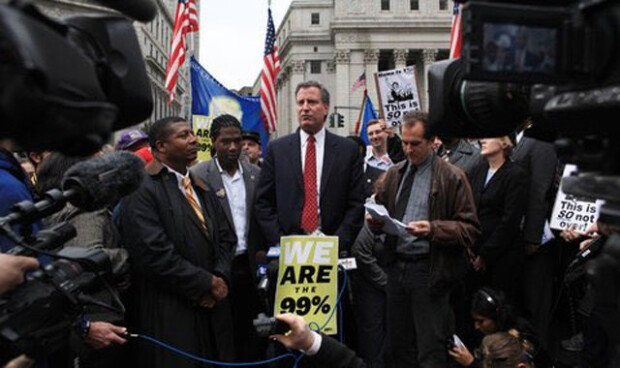Race for 2021 NYC mayor becomes competitive
Race for 2021 NYC mayor becomes competitive
Posted December. 16, 2020 07:43,
Updated December. 16, 2020 07:43

New York City Mayor Bill de Blasio, who is serving since January 2014, is thought to have a weak presence throughout his term although he is a re-elected leader of the largest city in the U.S. with a population of 8.35 million. Rudy Giuliani, who recently disgraced himself in public by sweating hair dye and farting on camera, fought against New York City’s violent crime rate during his term as the mayor from 1994 to 2001. His successor Michael Bloomberg, who is a billionaire and a three-term mayor, won praise for transforming old rail trail and factories in New York into the High Line and Chelsea Market. Bloomberg could make his bid for the Democratic nomination this year and Giuliani could vie for the Republican Party’s 2000 presidential nomination all thanks to their achievements as New York City Mayors.
De Blasio’s key policy is “impartiality in education.” From the first year in office, the mayor announced that he would eliminate the English and math test that decides admissions to eight specialized public high schools in New York, such as Stuyvesant High School and Brooklyn Technical High School and replace it with middle school grades and attendance. He also got rid of most of the subsidies for private high schools and charter schools promoted by his predecessor Bloomberg because those schools had the high proportion of whites and Asian-descents. He highlighted the importance of racial diversity on the outside but received heavy criticism for catering to blacks and Latinos since he was elected with an overwhelming support from them. The incumbent mayor eventually withdrew his plans to change admissions at the city’s specialized high schools after being pointed out that they are reverse discrimination against top students and dumbing down education but it clearly showed where his policies are headed.
Furthermore, de Blasio offered free meals at public schools and provided the socially marginalized with various support, including transportation subsidies. The purpose was good but the city faced budget crisis. In September this year when the city was hit hard by COVID-19, de Blasio asked for a 5 billion-dollar federal bailout of the city’s budget. Civic group named Citizens Against Government Waste (CAGW) called de Blasio the worst mayor ever, criticizing him for his poor management of the city’s budget.
The bigger problem is Wall Street firms moving jobs out of New York City. Wall Street banks and investment groups, such as Blackstone, Elliott, and Alliance Asset Management, announced their plans to move headquarters to Florida and Tennessee, where there state taxes and expenses are lower. In particular, Wall Street’s best-known firm Goldman Sachs, which has produced four secretaries of the Treasury, is planning to move one of its key divisions to Florida. Once Goldman Sachs leaves New York, it will inevitably take a toll on the city in terms of tax and jobs. The mayor, however, has failed to come up with measures to strengthen the city’s status as a financial hub.
In New York City, where about 70% of the registered voters are Democrats, the Democratic Party primary for the mayoral race in June next year is considered an event that will decide the city’s mayor. It means someone who wins the party primary can become the New York mayor even if they are not good at their job. Many think that de Blasio, who married to African-American woman, could win re-election thanks to an overwhelming support from Latino and African-American voters, which account for 54% of the city’s voters. De Blasio has not announced his plan to run for a third term but one thing is clear. One may win an election or two based on party ideology or race, but voters, after all, favor those who will help make their lives better.
Jung-Min Ha dew@donga.com






![“설거지해도 그대로”…냄비 ‘무지개 얼룩’ 5분 해결법 [알쓸톡]](https://dimg.donga.com/c/138/175/90/1/wps/NEWS/IMAGE/2026/01/15/133164664.3.png)
